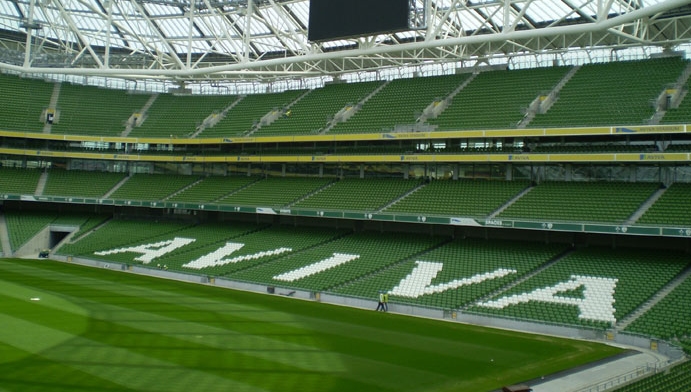Sunday, 15/02/2026 | 18:47 GMT+7
Aviva stadium, home of the Ireland rugby team will be fully powered by renewable energy for the upcoming 2016 Six Nations tournament, becoming the first stadium in the competition to be so.

The stadium has teamed up with SSE Airtricity - Ireland’s largest provider of wind power – who will supply green electricity and gas.
The move is expected to save almost 2,500 tonnes of carbon emissions in 2016 alone, equivalent to the fuel emitted by a jet circumnavigating the world 500 times or the carbon stored by 22 acres of mature rainforest.
“At Aviva Stadium, the jerseys, the seats and the pitch have always been green – now, by switching to SSE Airtricity, the energy at the stadium becomes 100% green,” said head of business energy at SSE Airtricity, Stephen Gallagher.
SSE Airtricity will also be helping the stadium to cut its day-to-day energy use through a variety of efficiency measures.
Rivals
Until now, Cardiff’s Millennium Stadium has been arguable the greenest venue in the competition, having achieved the BSI British Standard 8901 for Sustainable Management Systems for Events.
The Cardiff stadium has LED lighting, rainwater harvesting, and a segregated recycling system. Following the 2015 Rugby World Cup, the stadium recycled 98% of the plastic advertising hoardings around the venue.
Global transformation
The Six Nations will not be the only international sporting event going green this weekend, as Sunday night could see the first ever carbon-positive Superbowl, in Santa Clara, California.
This year’s venue, the $1.2bn Levi's Stadium became the first stadium in the United States to earn LEED Gold status when it opened in 2014.
The facility boasts 1,162 solar panels, which are designed to generate more electricity annually than is consumed during the 10 football games a year that it hosts. There are also three solar panel-covered bridges serving as entrances and exits to the stadium.
Since Levi's Stadium was constructed in the midst of California's longest-ever drought , water stewardship was a top priority. About 85% of the water used at the building is recycled water provided by the Santa Clara Valley Water District.
Around this year’s game, Pacific Gas & Electric (PG&E) will provide a temporary green power infrastructure that will consist of, electricity generated from hydrogen fuel cells, renewable diesel, and grid-based green energy.
The Superbowl concessionaire, will also manage a food service that will source all products from sustainable vendors within a 50-mile radius of Levi’s Stadium, and use cutlery and flatware made from compostable materials.
Edie.net








 Opening of the 2025 Energy-Efficient Equipment and Green Transition Exhibition Fair
Opening of the 2025 Energy-Efficient Equipment and Green Transition Exhibition Fair
 Consultation on the methodology for developing and updating energy consumption standards for four major industrial sectors
Consultation on the methodology for developing and updating energy consumption standards for four major industrial sectors
 Energy-saving solutions and green transition promotion
Energy-saving solutions and green transition promotion
 The 9th VEPG Steering Committee Meeting: Strengthening Coordination for Viet Nam’s Just Energy Transition
The 9th VEPG Steering Committee Meeting: Strengthening Coordination for Viet Nam’s Just Energy Transition